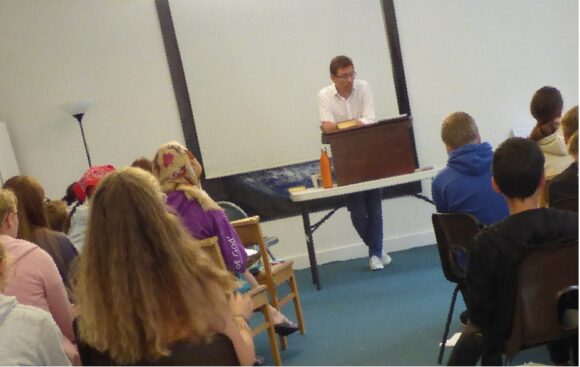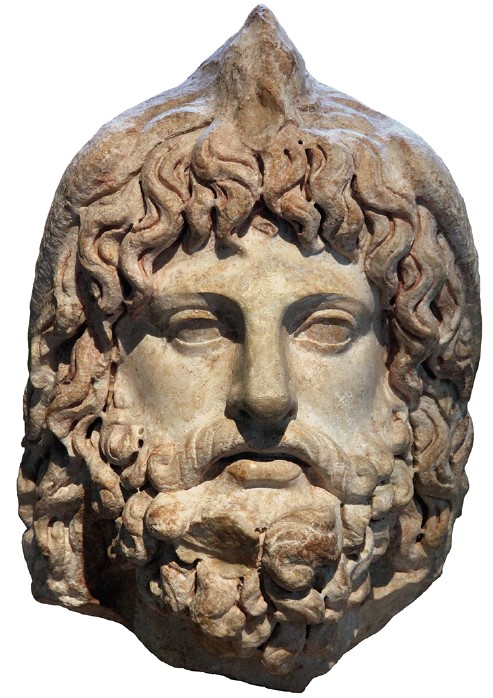IN EVERY GENERATION there seems to be a revival of the claim to possession of the Spirit gifts, particularly the gifts of tongues and of healing. There are today religious bodies who assert that these gifts are manifested in their services. Are these claims true? The Bible supplies the authoritative answer.
The Spirit of God is the radiant energy by which God is in touch with all creation: by which He performs His will. The following verses illustrate this. ‘When you send forth your Spirit, they are created, and you renew the face of the ground’ (Psalm 104:30); ‘Where shall I go from your Spirit? Or where shall I flee from your presence?’ (Psalm 139:7); ‘In him we live and move and have our being’ (Acts 17:28).
An instructive statement by King David shows that he was inspired by the Spirit of God: ‘The Spirit of the Lord speaks by me; his word is on my tongue’ (2 Samuel 23:2).
The Apostle Peter affirms that the Bible’s prophets did not speak their own words, but God’s: ‘No prophecy was ever produced by the will of man, but men spoke from God as they were carried along by the Holy Spirit’ (2 Peter 1:21).
Promised by Jesus
Jesus Christ promised his disciples that after his departure the helper, the Holy Spirit, would be sent to them: ‘When the Spirit of truth comes, he will guide you into all the truth, for he will not speak on his own authority, but whatever he hears he will speak, and he will declare to you the things that are to come’ (John 16:13). This was referring to the inspiration by which they would speak and write God’s Word. We have the evidence of the spirit of truth in the form of the Bible’s New Testament.
Jesus also promised his disciples the ability to produce signs: ‘These signs will accompany those who believe: in my name they will cast out demons; they will speak in new tongues; they will pick up serpents with their hands; and if they drink any deadly poison, it will not hurt them; they will lay their hands on the sick, and they will recover’ (Mark 16:17–18). With Mark’s account of the promise of Jesus we must compare the parallel record by Matthew. Jesus also said, ‘Behold, I am with you always, to the end of the age’ (Matthew 28:20). ‘The end of the age’ means ‘all the days’. It appears that Christ was telling his disciples that he would be with them till the end of that age—presumably the Jewish age, which lasted till the destruction of Jerusalem in 70 ad.
By this time the written Bible was almost complete. From the words of Matthew we can conclude that a time limitation is set to the gifts recorded in Mark.
The Acts of the Apostles
The book of Acts is the account of the community of believers in the years following Christ’s ascension to heaven. It commences with the coming of the Holy Spirit.
When the day of Pentecost arrived, they were all together in one place. And suddenly there came from heaven a sound like a mighty rushing wind, and it filled the entire house where they were sitting. And divided tongues as of fire appeared to them and rested on each one of them. And they were all filled with the Holy Spirit and began to speak in other tongues as the Spirit gave them utterance (Acts 2:1–4).
This phenomenon provoked amazement among the people around. Peter took the opportunity to preach the Gospel to them. When they were persuaded by his words and asked what they should do, he urged them, ‘Repent and be baptized every one of you in the name of Jesus Christ for the forgiveness of your sins, and you will receive the gift of the Holy Spirit. For the promise is for you and for your children and for all who are far off, everyone whom the Lord our God calls to himself’ (vs. 38–39). You and your children—that is, I suggest, two generations; and not limited to those present, but to all scattered abroad who received the truth.
On one occasion Philip went to Samaria. Here he performed miracles of healing which attested the truth of his message when he ‘proclaimed to them the Christ’ (Acts 8:5). Those who believed were baptized (v.12).
This account of the Samaritans receiving the Gospel is instructive in two ways. Firstly, the new converts had no gift of the Spirit: ‘for he had not yet fallen on any of them, but they had only been baptized in the name of the Lord Jesus’ (v. 16). So the gift of the Spirit is clearly not essential to entering the way of salvation, or automatic at baptism. Secondly, it was necessary for Peter and John to come from Jerusalem to confer the gifts of the Holy Spirit to the Samaritans—so it was evidently not in Philip’s power to do so.
Cornelius and his friends are the exception (about whom we read in chapter 10), in that the Spirit was given to them and they spoke with tongues before they were baptized (vs. 44–48). But this was to convince Peter and the Jews with him that God was indeed accepting the Gentiles, and that Cornelius must be received by them.
The Letters
Further information on the subject can be gathered from the letters of the New Testament. Communities of believers were founded throughout the Roman Empire within 30 years of the death of Christ. At first, of course, the written New Testament did not exist. They ‘reasoned’ concerning the purpose of God from the Old Testament (for example Acts 17:2). The letters to Romans and Hebrews show how the apostles used the Old Testament to demonstrate teaching about Christ.
But this knowledge derived from the Old Testament was opened up by means of the gifts of the Spirit, and it was supplemented by revelation through the same gifts. Peter noted that the Old Testament prophets did not understand their message fully. ‘It was revealed to them that they were serving not themselves but you, in the things that have now been announced to you through those who preached the good news to you by the Holy Spirit sent from heaven, things into which angels long to look’ (1 Peter 1:12).
Under the guidance of God the New Testament was written, and as each part was produced it received the endorsement of those who had the gift of prophecy (1 Corinthians 14:37), and was placed with the Old Testament and classed as ‘Scripture’ (2 Peter 3:16).
What Were the Gifts?
The fullest information concerning the gifts is to be found in 1 Corinthians chapters 12–14. The Apostle Paul provides a list of the gifts:
Now there are varieties of gifts, but the same Spirit; and there are varieties of service, but the same Lord; and there are varieties of activities, but it is the same God who empowers them all in everyone. To each is given the manifestation of the Spirit for the common good. For to one is given through the Spirit the utterance of wisdom, and to another the utterance of knowledge according to the same Spirit, to another faith by the same Spirit, to another gifts of healing by the one Spirit, to another the working of miracles, to another prophecy, to another the ability to distinguish between spirits, to another various kinds of tongues, to another the interpretation of tongues. All these are empowered by one and the same Spirit, who apportions to each one individually as he wills (1 Corinthians 12:4–11).
The relative importance of the gifts is given in verse 28: ‘God has appointed in the church first apostles, second prophets, third teachers, then miracles, then gifts of healing, helping, administrating, and various kinds of tongues.’ (Note that the gift of tongues, which is often most prominent today in churches which claim to possess the gifts, is the least important!) Reflection shows why the first three are in the position they occupy. They are all concerned with instruction—with imparting knowledge of the purpose of God. By this comes faith, without which no one is pleasing to God (Hebrews 11:6). The other gifts were subsidiary to this object, and served as a demonstration that the message was of God (1 Corinthians 2:3–5).
The presence of this variety of gifts led to rivalry in Corinth. It seems that there was desire for the showier gifts, and for the display of them. Meetings degenerated into scenes of disorder as they tried to override one another in the exhibition of their gifts. Paul corrected them:
What then, brothers? When you come together, each one has a hymn, a lesson, a revelation, a tongue, or an interpretation. Let all things be done for building up. If any speak in a tongue, let there be only two or at most three, and each in turn, and let someone interpret. But if there is no one to interpret, let each of them keep silent in church and speak to himself and to God. Let two or three prophets speak, and let the others weigh what is said. If a revelation is made to another sitting there, let the first be silent. For you can all prophesy one by one, so that all may learn and all be encouraged, and the spirits of prophets are subject to prophets. For God is not a God of confusion but of peace (ch. 14:26–33).
It should be noted that the gifts were under the control of those who possessed them, and Paul said they must be disciplined in their use of them. The governing principle in the exercise of the gifts was to be the edification of the church. For this reason the gift of prophecy was the more valuable.
Pursue love, and earnestly desire the spiritual gifts, especially that you may prophesy. For one who speaks in a tongue speaks not to men but to God; for no one understands him, but he utters mysteries in the Spirit. On the other hand, the one who prophesies speaks to people for their upbuilding and encouragement and consolation (ch. 14:1–3).
Prophesying, or ‘telling forth’ the mind of God, led to an intelligent grasp of God’s ways, and directed those who heard in the way of mental and moral harmony with God. Prophecy was essential for belief in the days when the New Testament did not exist. The reading of the Word of God is the modern equivalent of it. By it the mind receives instruction in God’s thoughts, and the character takes on a likeness to the character of Christ.
It follows that if the gifts of the spirit were available today, prophecy would be first and foremost—telling forth the things of God, in harmony with Bible teaching.
IN CHAPTERS 12–14 of 1 Corinthians, Paul was concerned to correct abuses of the spirit gifts. He began by giving the test by which the true was to be known from the false. The desire to excel led to the imitation of gifts, and therefore there was need for discrimination.
The existence of the false should not cause surprise. The true quickly leads to imitation. There were false prophets in Israel who led the people astray and were severely denounced (Jeremiah 29:8–9). The rise of false teachers in New Testament times was expected: ‘False prophets also arose among the people, just as there will be false teachers among you’ (2 Peter 2:1). ‘[Do not] be quickly shaken in mind or alarmed, either by a spirit or a spoken word, or a letter seeming to be from us, to the effect that the day of the Lord has come’ (2 Thessalonians 2:2).
It seems as though the Thessalonians were so wary of false prophets that they were suppressing the spirit gifts. Paul told them not to do this: ‘Do not quench the Spirit. Do not despise prophecies, but test everything; hold fast what is good’ (1 Thessalonians 5:19–21).
The need for testing the teachers continued as long as the gifts lasted. Several years later John found it necessary to write, ‘Beloved, do not believe every spirit, but test the spirits to see whether they are from God, for many false prophets have gone out into the world’ (1 John 4:1). In his letter to the Ephesians Jesus Christ commended them for exposing false apostles: ‘I know your works, your toil and your patient endurance, and how you cannot bear with those who are evil, but have tested those who call themselves apostles and are not, and found them to be false’ (Revelation 2:2).
So it should be no surprise that there are spurious claims to spirit gifts. They must be tested by the Word of God.
The Test of Teaching
There is one test which is unfailing—it was put forward by Paul, and later by John.
Now concerning spiritual gifts, brothers, I do not want you to be uninformed. You know that when you were pagans you were led astray to mute idols, however you were led. Therefore I want you to understand that no one speaking in the Spirit of God ever says “Jesus is accursed!” and no one can say “Jesus is Lord” except in the Holy Spirit (1 Corinthians 12:1–3).
A prominent god in the First Century was “My Lord Serapis ”. No teacher who was influenced by a pagan cult would assert that Jesus was lord. On the other hand, no teacher with the true gifts of the spirit would say “Jesus is accursed!” The test of the prophet was the truth of their teaching.
Paul was confronting the worship of ‘mute idols’. By the time John wrote, some years later, a new danger to faith had emerged, in the form of the infiltration of wrong teaching. ‘Many deceivers have gone out into the world, those who do not confess the coming of Jesus Christ in the flesh. Such a one is the deceiver and the antichrist’ (2 John 1:7).
Jesus was acknowledged as Lord, but it was denied that he had ‘come in the flesh’—that is, that he was a mortal man (Hebrews 2:14). The test again imposed was whether the doctrine taught was right. The test is one that can and should be applied in all ages. Is the teaching of those who claim to have spirit gifts in harmony with the Word of God? When people, for example, curse Jesus in their speech, or deny that he was a mortal man, then it is evident that the spirit in them is not of God.
A More Excellent Way
Gifts varied in value and importance. Paul says, ‘Earnestly desire the higher gifts.’ Then he adds, ‘And I will show you a still more excellent way’ (1 Corinthians 12:31). There is something better than the best gifts of the spirit, and that is the way of love he goes on to describe in chapter 13.
Love is essential to the follower of Christ. Its absence nullified any benefit the gifts conferred. ‘If I speak in the tongues of men and of angels, but have not love, I am a noisy gong or a clanging cymbal. And if I have prophetic powers, and understand all mysteries and all knowledge, and if I have all faith, so as to remove mountains, but have not love, I am nothing’ (vs. 1–2).
It was possible to display spirit gifts and yet be lacking in love, and therefore astray from God. Love must be the motivation for all that is done. It was evidently an important lesson to press home to the Corinthians.
Love never ends. As for prophecies, they will pass away; as for tongues, they will cease; as for knowledge, it will pass away. For we know in part and we prophesy in part, but when the perfect comes, the partial will pass away (vs. 8–10).
Paul says that the spirit gifts will cease, and he gives reasons. That phrase ‘in part’ means literally “from parts”. The prophecies, tongues and knowledge were spirits possessed by certain individuals, for the purpose of upbuilding the congregation. When the full New Testament was available, they would no longer be necessary and would pass away.
Next, he uses two illustrations to show the relative states of those who had the gifts and of those who had the completed revelation of God. The first one is taken from the progression from immaturity to maturity; the second refers to the contrast between the imperfect reflection in a burnished metal mirror, and the actual image:
When I was a child, I spoke like a child, I thought like a child, I reasoned like a child. When I became a man, I gave up childish ways. For now we see in a mirror dimly, but then face to face. Now I know in part; then I shall know fully, even as I have been fully known (vs. 11–12).
The Purpose of Spirit Gifts
In his letter to the Ephesians Paul explains God’s purpose in giving spirit gifts.
And he gave the apostles, the prophets, the evangelists, the shepherds and teachers, to equip the saints for the work of ministry, for building up the body of Christ, until we all attain to the unity of the faith and of the knowledge of the Son of God, to mature manhood, to the measure of the stature of the fullness of Christ (Ephesians 4:11–13).
Certain men, qualified in particular ways, were ‘given’ by God for the purpose of equipping the brotherhood for its work. It is noticeable that all the qualifications here named are for instruction. The equipment of the saints for this work was completed when Jesus sent his angel to give to John the last message (Revelation 22:6). No additions have been made since then.
Paul said to Timothy, ‘From childhood you have been acquainted with the sacred writings, which are able to make you wise for salvation through faith in Christ Jesus. All Scripture is breathed out by God and profitable for teaching, for reproof, for correction, and for training in righteousness, that the man of God may be complete, equipped for every good work’ (2 Timothy 3:15–17).
It is evident from what we learn of one particular gift—the gift of healing—that the gifts were limited. Paul himself, who had the gift of healing (Acts 19:12), was unable to heal his friends Epaphroditus (Philippians 2:25–30), or Trophimus (2 Timothy 4:20), or Timothy (1 Timothy 5:23). God enabled the exercise of the gift when it suited His purpose. His purpose was to attest to His message of salvation:
It was declared at first by the Lord, and it was attested to us by those who heard, while God also bore witness by signs and wonders and various miracles and by gifts of the Holy Spirit distributed according to his will (Hebrews 2:3–4).
We have seen that the spirit gifts were a temporary arrangement which, like all God’s arrangements, were perfectly designed to do the work for which they were intended. God is taking out of the nations a people. The means employed is the preaching of the Word. The spoken message of the First Century, with its appeal to and reasoning from the Old Testament, was the authoritative expression of God’s will. The inspired writings of the New Testament exercise the same authority today.
John Carter








